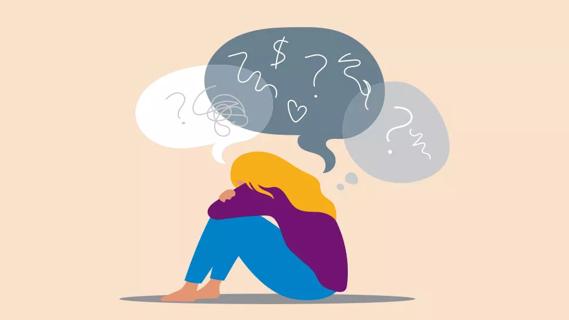Know the warning signs and when to get help

According to the Anxiety and Depression Association of America, anxiety disorders are the most common mental illness in the United States. Each year, they affect 40 million adults aged 18 and older, or 18.1% of the population. And while anxiety disorders are highly treatable, only 36.9% of those suffering from them seek help.
Advertisement
Cleveland Clinic is a non-profit academic medical center. Advertising on our site helps support our mission. We do not endorse non-Cleveland Clinic products or services. Policy
Given life’s ups and downs, we’ve all struggled with our emotional health at some point or another. And while we know our own battles, we might not always be aware of what friends and family members are going through. So, how can you tell when someone is having a tough time mentally and how can you encourage them to get help? It starts by recognizing what’s going on.
The terms “nervous breakdown” and “mental breakdown” are often used to describe people who are at the end of their rope. But they aren’t clinical diagnoses and mental health professionals don’t use those terms.
“I steer people away from using that terminology because I think it has a negative connotation to it,” says psychologist Adam Borland, PsyD. “People often have very valid reasons to feel overwhelmed, but those terms imply that it’s a personal weakness or failing, which it’s not.”
Instead, mental health issues are often the result of a mood disorder such as depression, an anxiety disorder or simply feeling overwhelmed by the stress of life.
Generally speaking, significant changes in behavior or daily activities are sometimes a cause for concern, Dr. Borland says. To recognize depression or anxiety, it’s important to watch for these signs:
Advertisement
If a loved one expresses that they are having a hard time or feeling overwhelmed, don’t be dismissive. Listen to them instead. Dr. Borland stresses that this is one of the most important things that you can do.
Don’t try to offer solutions or tell them to look at the bright side of things, Dr. Borland says. Just listen and offer empathy.
Dr. Borland further explains that you can validate their experience by saying things like, “You really have a lot on your plate. I can see why you feel so overwhelmed.” Or, “Those panic attacks sound scary. I’m sorry that’s happening to you.” Instead of inserting yourself and assuming you know what’s best for your family member, ask how you can help. Unsolicited advice is the last thing someone wants when they’re struggling emotionally.
And keep in mind questions like “Have you tried exercising/meditating/taking a vitamin/getting on meds?” are more like to annoy than help. Instead, simply ask the person what they need. For example, you might say: “Is there anything I can do to make this easier for you?”
You can also make specific suggestions about what you could do to help instead of telling the person what they should do differently. Try something like, “Would it help if I took the kids out tonight so you can have a couple of hours to yourself?”
If you feel like you should encourage your loved one to seek professional help, approach the topic gently. For some, this can be a very touchy subject, especially if they’ve never talked to a therapist or doctor about their mental health before. It’s also pretty sobering when people come to the realization that they can’t handle everything on their own.
When you’re ready to have the conversation, here are two examples of what you could say:
“You really seem to be struggling lately and I’m worried about you. How would you feel about talking to your doctor about what you’re going through?”
Or,
“I know the idea of going to therapy is kind of scary, but I really think it might help you. I did some research and found some therapists near here who specialize in anxiety. Can I help you make an appointment?”
Advertisement
If your friend or loved one isn’t ready, don’t argue with them or try to force the issue. Wait a while and then gently suggest again.
If you’re concerned that your loved one is thinking about suicide — or they’ve stated that they are — make a stronger case for getting professional help. Although suicide is a scary topic, it’s important not to panic.
Encourage your loved one to talk about what they’re feeling, even if it’s difficult to hear. At this point, be sure to stress how important it is to talk to a professional as soon as possible. Ask them direct questions, check for signs of substance abuse and determine if they do have a weapon or something that can be used to inflict harm.
If you feel that your loved one is in immediate danger of making a suicide attempt, take them to the closest emergency room or call 911.
Helping a loved one with mental health struggles is never an easy thing — but it is very necessary. Your support can help pave the way to recovery. Don’t get frustrated or give up. Keep encouraging them to get help, let them know that you’re there for them and get professional help sooner than later if they’re expressing thoughts of suicide.
Advertisement
Learn more about our editorial process.
Advertisement

Going home isn’t always easy, but there are ways to ease any stress you might feel

Managing stress can help you sleep more soundly

This fast-acting anxiety medication should never be taken with alcohol, despite what you may see on The White Lotus

Deep breathing, positive mantras and tackling negative thoughts can help get you out of your head and cool down your anxiety

Focusing on what you can see, feel, touch and hear can help you feel more present in the moment

Performance anxiety and stage fright are outsized stress responses that can creep up when you’re put on the spot

A healthy amount of anxiety can keep you safe from harm and motivate you to take action

Although different conditions, they can occur together or cause one another

The tropical fruit is a good source of antioxidants and vitamin C

Most people fall asleep within 10 to 20 minutes, but if your experience is different, adjusting your sleep schedule may help

Exploring your hidden side can lead to better understanding of what makes you tick